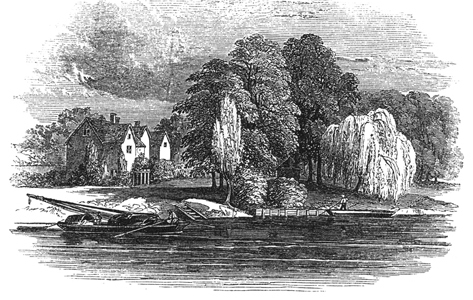Annotation:Trip to Ankerwick
X:1 T:Trip to Ankerwick M:6/8 L:1/8 B:Thompson’s Compleat Collection of 200 Favourite Country Dances, vol. 3 (London, 1773) Z:Transcribed and edited by Fynn Titford-Mock, 2007 Z:abc’s:AK/Fiddler’s Companion K:A c/d/|ec(A A)af|ec(A A)af|edc edc|BBB B2 c/d/| ec(A A)af|ec(A A)af|edc dcB|AAA A2:| |:C/D/|ECE FDF|GEG {B/c/}d2 C/D/|ECE FDF|GEe c2C/D/| ECE FDF|GEG {B/c/}d2B|ECE FDF|GEG A2:||

The first strain is shared with several tunes, including "Miss Dawson's Whim," "Molony's Jig," "Owen Malone," and "Trip to Denmark (1)."
Ankerwycke, Egham, Berkshire, was once the site of a Benedictine Convent, built on a bend in the Thames River on the north shore. It survived for some four hundred years, but was dissolved in 1536. The manor of Ankerwick was an ancient one, but in the 18th century passed into the hands of Elizabeth Lee, from her father John. Elizabeth married Sir Philip Harcourt, she being his second wife. Their son was John Harcourt of Ankerwick, and the manor remained in the hands of the Harcourt family for many generations.

